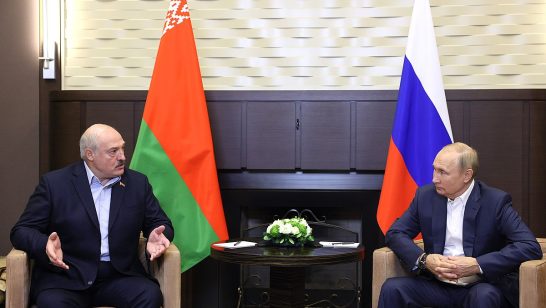
The decision by the United States government in July to transfer a portion of its stockpiled cluster munitions to Ukraine for use in the war begun by Russia has attracted global media coverage and sparked public debate.
The move follows Russia’s full-scale invasion of Ukraine on 24 February 2022 and widespread condemnation over Russia’s extensive use of cluster munitions, which has resulted in civilian deaths and injuries, damaged civilian infrastructure, and contaminated agricultural land. It comes after reporting from the United Nations, Human Rights Watch, and others that Ukrainian forces were also using cluster munitions and causing civilian casualties, though far less than Russian forces.
The visceral reaction to the US announcement demonstrates the growing awareness and understanding of the dangers posed by cluster munitions. Delivered from aircraft or fired in rockets, missiles, and artillery projectiles, cluster munitions open in the air to disperse multiple submunitions over a wide area, and their impact can be devastating when used in populated areas. Moreover, many submunitions fail to detonate as designed and pose a threat long after a conflict ends.
The stigmatisation of cluster munitions has intensified over the past 15 years, since the Convention on Cluster Munitions was adopted in Dublin on 30 May 2008. The convention provides a comprehensive framework for eradicating cluster munitions, prohibiting any use, acquisition, production, stockpiling, and transfer under any circumstances. It requires the destruction of cluster munition stocks, clearance of areas contaminated by cluster munition remnants, and assistance to victims of these weapons.
Countries that have endorsed the ban on cluster munitions have a collective responsibility to end the human suffering caused by these weapons.
Countries that have endorsed the ban on cluster munitions have a collective responsibility to end the human suffering caused by these weapons. To protect the convention’s gains and strengthen its impact, they should take three steps: condemn all use of cluster munitions at any time; uphold their obligations not to assist with the transfer and use of cluster munitions; and encourage states outside the convention to join as soon as possible.
Reactions to the transfer decision
Russia, the United States, and Ukraine are not parties to the convention. Nonetheless, President Joe Biden’s decision to transfer cluster munitions to Ukraine came as a shock to many because the US has not used cluster munitions since 2003 – with the exception of a single strike in Yemen in 2009 – and last produced and transferred them in 2016. While the US has not signed the international treaty banning cluster munitions, the move away from cluster munitions was read by some as a slow-motion effort to align practice with the main provisions of the convention.
With a total of 112 states parties and 11 signatories, the convention has had a significant impact. There have been no confirmed reports or allegations of new use, production, or transfers of cluster munitions by any state party since the convention was adopted. States parties have destroyed a total of nearly 1.5 million cluster munitions and 178.5 million submunitions, 99 percent of their stocks.
Given the stigma against cluster munitions and recent US practice, the US transfers announcement attracted comment from more than 20 world leaders and top officials.
The United Kingdom’s Prime Minister Rishi Sunak affirmed his country’s status as a state party to the Convention on Cluster Munitions, which he said, “prohibits the production or use of cluster munitions and discourages their use.” The reference to the convention reflects the UK’s legal obligation to “promote the norms” that the convention establishes.
The Foreign Affairs Ministry of Laos, a state party to the convention, expressed “profound concern over the announcement” and the use of cluster munitions in Ukraine. It recalled that “the Lao people were victimised by this deadly cluster munition more than five decades ago and even today they continue to be affected by the unexploded ordnance as it continues to pose serious threats to the lives and livelihood of our people.”
Other countries to speak out against the use of cluster munitions in response to the US decision to transfer them to Ukraine include Austria, Cambodia, Canada, Germany, Nicaragua, Norway, the Philippines, and Spain.
Condemnation of cluster munition use
To reinforce these statements on the US transfer, it’s critical for all states parties to use the convention’s Eleventh Meeting of States Parties, which opens at the United Nations in Geneva on 11 September, to firmly condemn cluster munitions in accordance with the convention’s object and provisions.
At their last meeting, in September 2022, the states parties collectively underscored in the final report their obligation never to use cluster munitions under any circumstances and “condemned any use of cluster munitions by any actor.” They expressed their grave concern over the increase in civilian casualties and the humanitarian impact resulting from the repeated and well-documented use of cluster munitions in recent years, particularly in Ukraine.
States parties should include similarly strong language in the final report of this year’s annual meeting of the convention.
Prohibition on assistance
States parties that are supporting Ukraine in the ongoing war should explain the steps they are taking to ensure that they do not intentionally, directly, or deliberately assist, induce, or encourage any prohibited activity.
This is necessary as the new use and transfers are raising issues about how states parties are interpreting the convention. Many want to know how the US cluster munitions reached Ukraine. Were they pulled from stockpiles held on US bases in Germany, Italy, or another state party to the convention? How were they transferred into Ukraine – over or through the territory of a state party to the convention?
These are crucial questions. The Convention on Cluster Munitions includes a strict ban on assistance with prohibited activities. Based on that provision, at least 35 states parties have agreed that the convention bans the transit of cluster munitions across or through the national territory, airspace, or waters of a state party. They have concluded that transit amounts to assistance with transfer and possibly use.
Yet a handful of states parties including the Netherlands, Portugal, Sweden, and the UK have taken the opposite view, contending that the convention does not prohibit transit and foreign stockpiling.
Since the first tranche of US cluster munitions was transferred, Ukraine has swiftly put them to use. Photographs show 155mm Caesar howitzers produced by France and supplied by Denmark apparently being used to fire US cluster munitions, raising concerns for these States Parties over providing dual-use systems intended for one purpose but used for another. If such systems were intentionally provided for the purposes of delivering cluster munitions, it would most likely contravene the convention’s prohibition on assistance with use.
Universalisation of the Convention
Finally, states parties should encourage states that have not joined the Convention on Cluster Munitions to adopt this important international treaty without delay. South Sudan did so by acceding to the convention on 3 August. Nigeria ratified it at the end of February.
Adherence to the Convention on Cluster Munitions in Europe is strong, with 21 of 27 European Union member states on board. Estonia, Finland, Greece, Latvia, Poland, and Romania should revisit their positions and take swift steps to accede to the convention. Cyprus, which signed the convention in 2009, should retire its well-worn excuse that ratification cannot proceed until “the special security situation on the island” is resolved.
****
Many of the obstacles to the eradication of cluster munitions lie with states that have not joined the convention. However, there are valuable steps that states parties and supportive states can take. Expressions of condemnation, strong interpretations, thorough implementation, and universalisation can advance the convention’s norms and work to reduce the “unacceptable harm” they cause.
The opinions articulated above represent the views of the author(s) and do not necessarily reflect the position of the European Leadership Network or any of its members. The ELN’s aim is to encourage debates that will help develop Europe’s capacity to address the pressing foreign, defence, and security policy challenges of our time.
Image: Flickr, (c) Stéphane De Greef, Landmine and Cluster Munition Monitor




